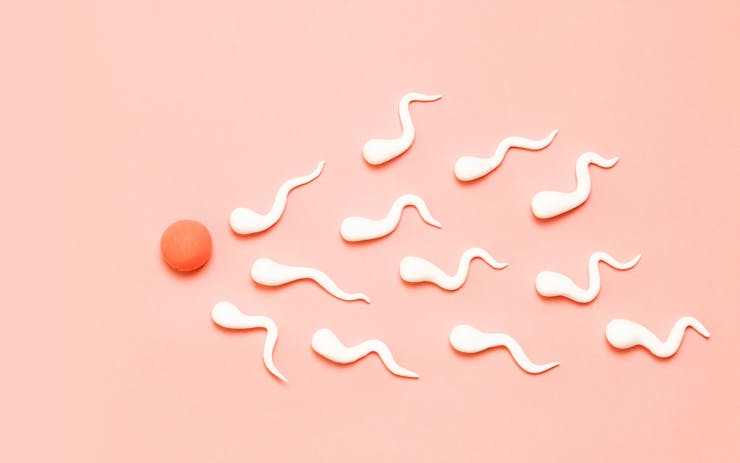The desperate years my partner and I spent trying—and failing—to produce a second child were full of contrasts. On the one hand, almost everyone who hadn’t experienced miscarriage or infertility themselves suggested that if we ‘just relaxed,’ a baby would materialize.
On the other hand, the doctors who defined our substandard fertility had nothing relaxing to offer us. Instead, they prescribed rules and routines covering everything from diet to sex, to the precise number of daily blood draws and vaginal probe ultrasounds required to give us a shot at viable pregnancy. They also told us how much alcohol we could drink (not much) and how much cannabis we could consume (none at all).
Join the Leafly Canada CommunityThis advice seemed reasonable—we understood the harms of smoking anything, and studies at the time showed a negative relationship between THC use and sperm health.
So we followed the rules, but I always wondered which ones mattered most, and how much they mattered. Like, if a would-be dad had to choose one commandment, would it be more effective to ditch the monthly joint, or forgo the daily tighty-whities, since snug underwear kills sperm, too? (Important: my partner wants you to know that I concocted these example statements, and he has no comment on either cannabis or underwear.)
More recently, a Canadian Medical Association Journal (CMAJ) review and its accompanying podcast offer new perspectives on the issue of cannabis and fertility. It’s decently comprehensive, but the questions that plague most cannabis studies remain, and for the same reasons.
Complicated Cannabis
Briefly, here are two (of many) issues frequent to cannabis research:
One, cannabis is a complex plant with multiple permutations, and studying one type doesn’t necessarily tell you about the others. For example, research on people who smoke cannabis heavily may not apply to those who eat it moderately.
Two, like the rest of them, cannabis studies are still overwhelmingly conducted with male subjects. Refreshingly, co-author Dr. Sara Ilnitsky addresses many of the report’s gaps in the podcast.
Here’s a summary of the review’s main findings, and the questions that remain:
Quality evidence around cannabis and fertility is lacking
But we do know that THC “acts on receptors found in the hypothalamus, pituitary and internal reproductive organs in both males and females.” In other words, there’s probably a relationship, we just don’t understand it.
We don’t know how THC affects sperm
To be clear, the report’s authors didn’t come to this conclusion. Instead, they warn that “smoking marijuana more than once a week is associated with a 29% reduction in sperm count.”
Cannabis specialist Dr. Michael Verbora notes, however, that the review omitted conflicting Harvard findings that men who’d smoked pot at least once in their lives had higher sperm concentration than men who hadn’t. Some speculate that frequency of consumption might explain the differences, but at this point no one really knows.
It’s hard to study cannabis’s impact on women’s fertility
Because we don’t have direct measures like “semen parameters”. (If you learn nothing else from this article, please let it be this phrase).
Cannabis may delay, and even prevent, ovulation in women
The ONE good study we have on fertility and female cannabis use found that smoking pot could delay ovulation for up to 3.5 days. This could be significant, but again, it’s hard to draw conclusions from just one study.
In the general population, cannabis use does not appear to affect time to conception, but it might for infertile couples
A large national study of family growth in the US found no difference in time to conception between cannabis smokers and non-consumers, but that doesn’t tell us much about pro-creatively challenged couples specifically.
Says, Dr. Ilnitsky: “If you look at the effects that we’ve seen in other studies, like reduced sperm motility in men and delayed ovulation in women, if you add those two potential factors in a couple that’s already having trouble getting pregnant at baseline, it could potentially just exacerbate their difficulty getting pregnant. That being said we don’t have any actual studies on that specific topic.”
The Final Word
The going advice in fertility clinics and public health messaging is to avoid cannabis if you’re trying to get pregnant, but this caution is rooted in uncertainty about what might happen, not confidence in what will.
So if a threesome with a lab technician isn’t part of your baby-making arrangement (editor’s note: this is not how assisted reproduction actually works), and you’re going to do it the old-fashioned way, you should also know that cannabis users report having more and better sex.
As for me and my partner, although we are blessed in most ways, we never did have that second baby, and that’s a sadness we’ll carry forever. Thankfully, it does get easier with time…and cannabis.





